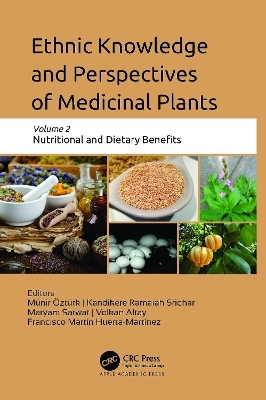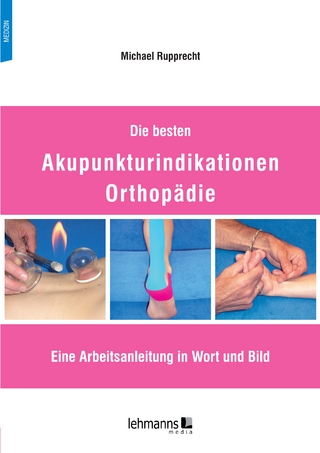
Ethnic Knowledge and Perspectives of Medicinal Plants
Apple Academic Press Inc. (Verlag)
978-1-77491-229-4 (ISBN)
This new 2-volume set aims to share and preserve ethnic and traditional knowledge of herbal medicine and treatments, while also emphasizing the link between biodiversity, human nutrition, and food security. Ethnic Knowledge and Perspectives of Medicinal Plants is divided into two volumes, with volume 1 focusing on the traditional use of curative properties and treatment strategies of medicinal plants, and volume 2 addressing the varied nutritional and dietary benefits of medicinal plants and the practice of Ayurveda. Both volumes stress the importance of bioresources for human nutrition and nutraceuticals based on ethnic knowledge and the need for efforts to protect biodiversity in many regions rich with medicinal plants.
Exploring the benefits of medicinal plants in disease prevention, treatment, and management, Volume 1 discusses the traditional use of medicinal plants as promising therapeutics for cancer, liver conditions, COVID-19, and other human ailments. It examines the efficacy of Ayurvedic and Chinese herbal medicine, Indian traditional medicine, and other ethnic herbal practices used by indigenous peoples of Azerbaijan, South America, Turkey, India, etc. A variety of plants are discussed, and the ethnomedicinal applications of over 100 wild mushrooms for their medicinal and healthcare purposes are elaborated on.
While volume 1 focuses primarily on natural plant resources for addressing specific health issues, volume 2 looks at traditional medicinal plant use for their nutritional and dietary benefits, while also encouraging the preservation of biodiversity for healthy and sustainable diets. The volume presents information on over 2200 vascular plant taxa from 127 families as well as many taxa from leaf parts, fruits, underground parts, floral parts, seeds, and more that have potential use as edible food plants. Ethnic knowledge on the wild edible mushrooms is an emerging area, which is unique and is dependent on the folk knowledge of tribals; this volume discusses the unique nutritional attributes of wild edible mushrooms (206 species belonging to 73 genera) in Southern India. The authors look at various lichens as nutritional aids and medicine and as flavoring agents and spices. Fucoidans derived from the seaweeds (and spirulina) are described for their antioxidant activity, nutritional and anti-aging properties, antiviral activities, anti-cancer properties, anti-diabetic properties, and more. The authors also examine how ethnicity affects healthcare/nutritive systems at different levels through various dynamics such as lower income, inability for services uptake, disputes among different ethnic groups, cultural attitudes (some ethnic group are vegetarian), lack of socio-economic resources, and disease prevalence.
Together, these two important volumes aim to preserve and disseminate the valuable ethnic knowledge of medicinal plants gained over thousands of years and to promote the value of integrating and safeguarding biodiversity.
Münir Öztürk, PhD, DSc, has served at the Ege University Izmir, Turkey, for 50 years in various positions. He is currently a Vice President of the Islamic World Academy of Sciences. He has received fellowships from the Alexander von Humboldt Foundation, the Japanese Society for Promotion of Science, and the National Science Foundation (USA). Dr. Ozturk has served as Chairman of the Botany Department and Founding Director of the Centre for Environmental Sudies an Ege University, Izmir, Turkey. He was also a Consultant Fellow at the Faculty of Forestry at at Universiti Putra Malaysia, Malaysia, and a Distinguished Visiting Scientist at the International Center for Chemical and Biological Sciences (ICCBS) at Karachi University, Pakistan. His fields of scientific interest are plant ecophysiology, medicinal and aromatic plants, conservation of plant diversity, biosaline agriculture, and crops, pollution, and biomonitoring. He has published 50 books, 80 book chapters, and 200 papers in journals with significant impact factors. Dr. Öztürk holds PhD and DSc degrees from Ege University, Turkey. Kandikere R. Sridhar, PhD, is Adjunct Professor in the Department of Biosciences, Mangalore University, and Yenepoya (Deemed to be University), both in Konaje, India. His main area of research is the "Diversity and Ecology of Fungi of the Western Ghats, Mangroves and Marine Habitats." He was a NSERC postdoctoral fellow/visiting professor at Mount Allison University, Canada; Helmholtz Centre for Environmental Research–UFZ and Martin Luther University, Germany; and Center of Biology, University of Minho, Portugal. He was recipient of The Shome Memorial Award (2004) and the Lifetime Achievement Awardee (2019), given by the Mycological Society of India, of which he was Vice-President (2013) and President (2018). He was a recipient of The Fellow of Indian Mycological Society, Kolkata, India (2014); and Distinguished Asian Mycologist (2015) and Outstanding Leader in Education and Research from the Association of Agricultural Technology of Southeast Asia (2016). He was a University Grants Commission Basic Scientific Research Faculty Fellow (2014-2017). He is one among the world top 2% scientists in the field of mycology (2020-21), as assessed by Stanford University, the Alper-Doger Scientific Index, and Elsevier. He has over 450 publications and eight edited books to his credit. Maryam Sarwat, PhD, is Associate Professor at Amity University, Noida, India. She completed her PhD at Jamia Hamdard University and did her Postdoctoral Research at the International Centre for Genetic Engineering and Biotechnology (ICGEB), India. Dr. Sarwat has published over 44 papers in international journals and five books with Springer Nature, Elsevier, and King Abdul Aziz University Press. She has three books (with Elsevier and Taylor and Francis) in progress. Her cumulative impact factor is 152 with 2400 total citations, an h-index of 20, and an i-10 index of 28. She has received a "Scientist of the Year Award" from the National Environment Science Academy (NESA), India. Dr. Sarwat has served as the guest editor of the special issue for Current Pharmaceutical Design (impact factor 3.2) and Seminars in Cell and Development Biology (impact factor 7.7). She is a reviewer and editorial board member of more than 10 international journals. Volkan Altay, PhD, is a full Professor in the Biology Department, Faculty of Science and Arts, at Hatay Mustafa Kemal University, Turkey. His fields of interest are plant ecology, vegetation ecology, taxonomy, biodiversity, biomonitoring and pollution ecology, and sustainable use of medicinal plant resources. He received his PhD in 2009 and holds a proven track record of nearly 100 publications in highly reputed professional journals. He has also published four books, nearly 45 research articles in impact factor journals, more than 40 book chapters and reviews, and more than 70 international and national congress reports. Francisco Martín Huerta-Martínez, PhD, is a biologist and Professor in the Biological and Environmental Division at the University of Guadalajara, Mexico. He has over 32 years of experience in the Applied Ecology Department, where he teaches and does research on ecology. He has administration experience from his role as Chief at the Applied Ecology Department from 2004 to 2007, as the Academic Coordinator of the bachelor’s program in biology from 2007 to 2009, and as Coordinator at a doctorate program from 2015 to 2018. His research interests are plant ecology, plant biodiversity and conservation, biotic interactions, ethnobotany, forest ecology, and biological invasions. He has published research papers in prestigious peer-reviewed journals and one international book. Dr. Huerta-Martínez has supervised PhD, MSc, and undergraduate theses. From 2004 to 2010 and from 2018 to now, he has been a member of the National System of Researchers in Mexico. Currently, he is a member of the Ecological Society of America (ESA) and has participated in several of its annual meetings. Dr. Huerta-Martínez earned his MSc (with a specialty in Botany) from Colegio de Postgraduados in Mexico State in 1995 and his PhD (with a specialty in Botany) at the same institution in 2003.
PART I: ETHNIC KNOWLEDGE 1. Traditional Use of Plant Diversity for Nutritional Purposes: A Case Study from Istanbul (Turkiye) 2. Ethnic Knowledge on Medicinal and Nutritional Attributes of Lichens with Emphasis on the Western Ghats 3. Nutritional Herbs from Karabakh, Azerbaijan 4. One-Hundred Plant Species Used by Tribals in the Western Ghats 5. Folkloric Knowledge of Endemic Plant Species Traditionally Used as Spices, Food Plants and Herbal Teas in Turkiye 6. The Bagrote Valley Gilgit Baltistan: Plant Diversity and Ethnobotanical Aspects 7. Wild Food Plants from North Waziristan Tribal District, Khyber Pakhtunkhawa, Pakistan and Their Curative Uses 8. Nutrition and Health in Ethnic Groups of Azad Jammu and Kashmir, Pakistan 9. Wild Edible Plants and Their Remedial Uses Among the Different Tribes of Chitral Valley, Hindukush Range, Pakistan PART II: ETHNIC FOODS 10. Spirulina: Ethnic Food and Potential Health Applications 11. Functional Properties of Traditionally Edible Leafy Vegetable Talinum triangulare 12. Nutritional and Functional Attributes of Myristica malabarica Fruits 13. Functional Attributes of Ethnically Edible Fiddleheads in the Western Ghats 14. Nutritional and Medicinal Potential of Local and Seasonal Foods of India 15. Nutritional Attributes of Wild Edible Mushrooms in Southern India 16. Wild Edible Fungi of I?d?r Province (Turkey) 17. Indian Traditional Food from an Ayurveda Perspective PART III: NUTRACEUTICALS 18. Nutraceutical Potential of Fucoidans Derived from Seaweeds 19. Traditional Nutraceutical Perspectives of Floral Honey: A Review 20. Biochemical and Nutritional Attributes of Wild Floral Honey of the Western Ghats and West Coast of India 21. Ethnic Nutritional, Medicinal, and Packaging Values of Leaves PART IV: NUTRITIONAL SECURITY 22. Spirulina as a Dietary Supplement: Moving Towards Food Security 23. Quinoa: Golden Grain of 21st Century 24. Insight on the Total Lipids and Fatty Acids of Garcinia gummi-gutta Seeds 25. Bioactive Potential of Ethnically Edible Banana Inflorescence 26. Role of Plants to Manage Diseases 27. Sleep Physiology and Traditional Nutritional Practices
| Erscheinungsdatum | 20.07.2023 |
|---|---|
| Zusatzinfo | 56 Tables, black and white; 16 Illustrations, color; 63 Illustrations, black and white |
| Verlagsort | Oakville |
| Sprache | englisch |
| Maße | 156 x 234 mm |
| Gewicht | 1260 g |
| Themenwelt | Sachbuch/Ratgeber ► Gesundheit / Leben / Psychologie ► Alternative Heilverfahren |
| Schulbuch / Wörterbuch | |
| Medizin / Pharmazie ► Naturheilkunde | |
| Technik | |
| Weitere Fachgebiete ► Land- / Forstwirtschaft / Fischerei | |
| ISBN-10 | 1-77491-229-5 / 1774912295 |
| ISBN-13 | 978-1-77491-229-4 / 9781774912294 |
| Zustand | Neuware |
| Informationen gemäß Produktsicherheitsverordnung (GPSR) | |
| Haben Sie eine Frage zum Produkt? |
aus dem Bereich


